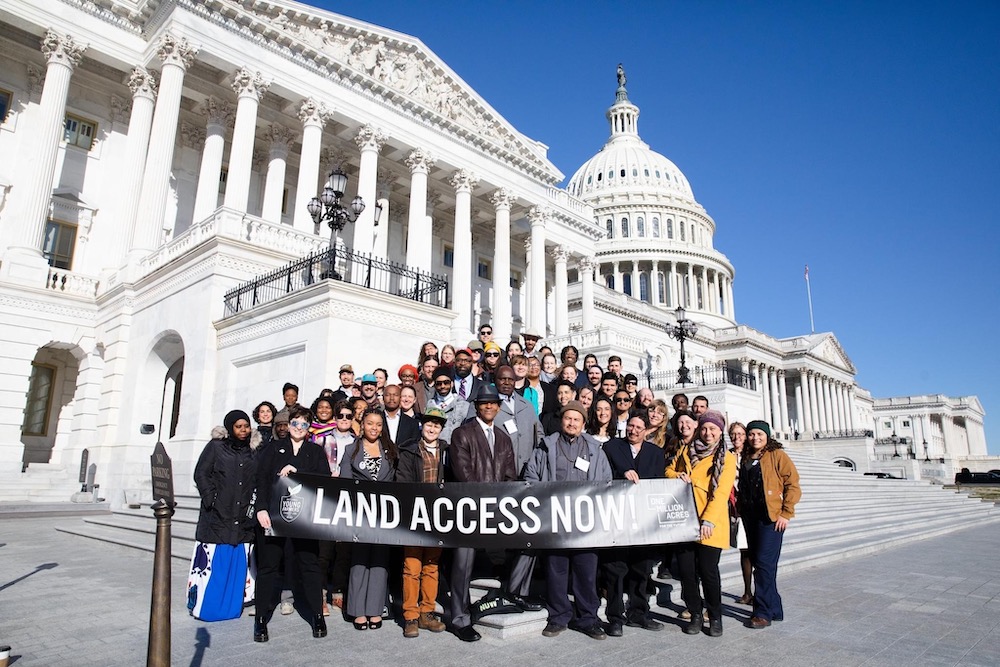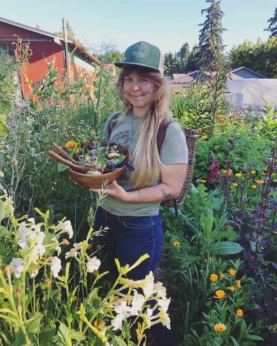It’s crucial that the next farm bill includes the Increasing Land Access, Security, and Opportunities Act. Here’s why.

As a teenager, I distinctly remember my father telling me to not follow in the family business. I now know he said this to shield me from the many hardships farmers continue to face. America’s farmers, especially beginning and Black, Indigenous and People of Color (BIPOC) farmers face insurmountable challenges, yet 87 percent of young farmers are dedicated to regenerative, climate-smart farming practices. Today’s beginning farmers are passionate about growing nourishing foods, diversified crops and building soil; yet because of astronomical real estate costs, most farmers are unable to purchase land on which to operate.
The farm bill is a critical bipartisan package of legislation that renews every five years, and it expired on September 30, 2023. To avert a government shutdown, the Senate passed an extension bill to keep the essential programs running through the end of September 2024. This tightrope omnibus bill funds the SNAP program, farmer subsidies and USDA loan programs and grants. Eaters and farmers alike depend on this bill to get food on the table.
As a farmer’s daughter and farm advocate, I know that the farm bill has one of the greatest impacts on what you eat, how that food was grown and the ability of beginning farmers to find land in the first place. Many of my friends are farmers and I’ve seen them struggle against countless barriers, especially when it comes to accessing or purchasing land. In a recent National Young Farmers Coalition survey, 59 percent of young farmers named finding affordable land to buy as “very or extremely challenging.”
I’ve come to understand that despite where a farmer lives or what they grow, the lack of affordable land to farm is the number one reason farmers are leaving agriculture, the top challenge for current farmers and the primary barrier preventing aspiring farmers from getting started. The next farm bill can fix this.
Oregon agriculture is a part of my identity. I grow small-scale herbs, seeds and nursery starts in my backyard garden and work in the nonprofit agriculture world. My Land Advocacy Fellowship with the National Young Farmer Coalition empowered me to share my experience of growing up on the family farm with my senators and representatives offices on Capitol Hill in Washington, D.C.

Photo courtesy of Carly Boyer.
In June 2023, the United States Department of Agriculture (USDA) announced the awardees of the $300-million Increasing Land, Capital, and Market Access Program, which included 50 community-based projects for underserved farmers, ranchers and forest landowners. Three projects were funded here in Oregon, led by the Black Oregon Land Trust, Indian Land Tenure Foundation program and Community Development Corporation of Oregon. This program resulted in federal dollars going out the door, directly benefiting community-led land access solutions. It was also a one-time funding opportunity that I believe should be made permanent.
Following the creation of that one-time program, the bipartisan Increasing Land Access, Securities, and Opportunities Act (LASO) was introduced in both the House and the Senate. The LASO Act would expand on the promise of the Increasing Land, Capital, and Market Access Program. If enacted, this bill would authorize $100 million in annual funding for community-led land access solutions through the next farm bill. This would be a significant victory for young farmers, ranchers and everyone who has been fighting to win federal funding to address issues of equitable land access.
Flying to Washington, D.C with farmer Michelle Week of Good Rain Farm really impacted me. Hearing her experience of feeding more than 150 families in her Community Supported Agriculture (CSA) subscription yet still unable to afford to purchase farmland as an Indigenous woman in the Portland Metro area is alarming.
Across the country, farmland is being lost to development at a rate of more than 2,000 acres per day. Over the next 20 years, nearly half of US farmland is expected to change hands. Additionally, Black farmers across the United States have lost 90 percent of their historic farmland due to systemic racism and discriminatory lending. Today, according to the most recently available statistics, 95 percent of farmers are white in the United States and 96 percent of land owners are white. For these reasons and more, I advocate for federal reparations in the form of land access through the LASO bill.
We all eat and, in order to eat, we all need farmers. I hope you’ll consider getting in contact with your members of Congress today and urge them to support farmers by asking them to include the Increasing Land Access, Security, and Opportunities Act (H.R.3955, S.2340) in the next farm bill. With the current farm bill temporarily extended, it’s a pivotal moment to uplift critical policy changes like the LASO Act and invest in the health and well-being of our communities, our food system and the future we all deserve.
Carly Boyer (she/they) is a fourth-generation land manager, stewarding 140 acres in Polk County, OR. She works for Oregon Climate and Agriculture Network, an agricultural non-profit focused on Soil health. She is a board member for Rogue Farm Corps, a beginning farmer program and a Land Advocacy Fellow with the National Young Farmers Coalition advocating for the One Million Acres for the Future Farm Bill campaign in Washington, D.C.
Unless we adopt policies that address the long-standing tradition of devaluing our food, new entrant farmers will continue to be pushed towards lower value and higher risk lands. Meanwhile, existing farmers are often tasked with gleaning greater production from the land, despite the possible environmental implications of more intensive practices. We need to create a food system that adequately values nutritious food, respects the environment where it is produced, and provides living wages to the communities that produce it.
Amen to Melanie Harrison. We, consumers, demand lots of cheap food, driving these chemical companies and agribusinesses to create ever more destructive practices to satisfy our insatiable appetite.